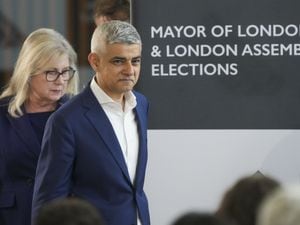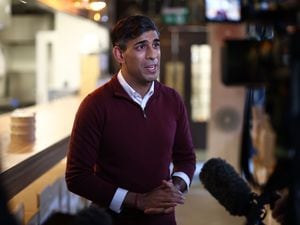Father wins legal battle against police watchdog over son’s fatal shooting
Glenn Skelton challenged a decision by a police watchdog not to re-investigate the actions of an armed officer who had fatally shot Lewis Skelton.

The father of a man shot dead by police has won a High Court challenge against a watchdog’s decision not to re-investigate the actions of an armed officer.
Lewis Skelton, 31, was carrying an axe through Hull city centre when he was tasered four times and shot twice in the back by police on November 29 2016. He later died in hospital.
The former police watchdog, the Independent Police Complaints Commission (IPCC), investigated the shooting but took no further action against the Humberside Police officer who fired the fatal shots, known only as B50.

After an inquest found that Mr Skelton was unlawfully killed in 2021, the IPCC’s successor, the Independent Office for Police Conduct (IOPC), decided not to re-investigate the case despite finding two flaws in the initial review.
Mr Skelton’s father, Glenn Skelton, challenged the finding at the High Court, with Mrs Justice Hull ruling on Friday that it should be quashed and a new decision be made.
Lewis Skelton, who had struggled with mental health problems, was reported to police through four 999 calls on the day of the shooting after being seen walking with an axe.
After being found by armed police, B50 and another officer – known only as Charlie – fired their Tasers, but this had no effect.
B50 then shot him twice in the back from close range with a pistol, with an IPCC investigation finding that “it was his honestly held belief that Mr Skelton posed a threat” to members of the public.
An inquest jury ruled in October 2021 that Mr Skelton was unlawfully killed, with the High Court rejecting a legal challenge against the decision by B50 last year.
The IOPC found two flaws in the IPCC’s initial review of the incident, relating to B50’s perception of Mr Skelton’s speed and his allegation that he was behaving in a threatening way.
But it deemed a new investigation was unnecessary as the flaws had no “material impact” on the original outcome, there was no new information that could have led to a different decision, and it was not in the public interest to re-order an investigation.
In a two-day hearing in Leeds in February this year, barristers for Glenn Skelton claimed that the IOPC had misapplied its policy and that its review “had been working on the basis that Mr Skelton posed a greater threat than was justified”, meaning some of its conclusions were “irrational or unreasonable” as a result.
While the IOPC opposed the challenge, Mrs Justice Hill said: “Given the direct relevance of both the flaws to the investigator’s analysis, it must follow that if the flaws had not occurred, the decisions taken in the investigation might have been different.”
She continued: “The defendant recognised that if the flaws had not been made, the investigator might have identified realistic alternative options for B50 other than the use of force.
“This effectively confirms that the flaws in the original investigation might have had an impact on the subsequent decisions.”
In a statement following the decision, Mr Skelton’s family said: “It is now seven-and-a-half years since Lewis was shot dead, there has still been no acceptance from Humberside Police, the officer, or the IOPC that anything really went wrong that day.
“All we have faced is constant denial and challenges at every stage and attempts to make us give up and go away. We have called for a proper investigation from the start – a chance for us to see justice for Lewis – and we’ve been ignored.
“The inquest jury, who sat and considered all the evidence, witnessed the officers giving evidence and being questioned, and viewed the CCTV footage, and concluded Lewis was unlawfully killed. Yet, what’s happened to the officers involved?
“We thank our legal team for continuing to fight for justice for Lewis. It has been hard for us as a family to keep doing this, to keep coming back to Court, but we will always do so to get justice for Lewis, and to ensure other families don’t suffer in the way we have.”
IOPC regional director Emily Barry said: “Lewis Skelton’s death was a tragedy that has had a profound impact on his family, friends and the wider community. Our thoughts remain with all those affected by what happened.
“The fatal police shooting of Mr Skelton was subject to a thorough investigation, which concluded in 2017, by our predecessor, the Independent Police Complaints Commission (IPCC).
“The investigation examined the circumstances of the incident. Throughout that investigation, the officer who fired the shots was treated as a witness rather than being under investigation for his conduct.
“The IPCC concluded the officer acted under the genuine belief it was necessary to prevent a threat to life.
“Following the inquest, which concluded four years later in 2021, Mr Skelton’s family asked us to reopen the investigation.
“In light of this request, and the jury’s verdict that Mr Skelton was unlawfully killed, we carried out a detailed review of both the IPCC investigation and the evidence heard during the inquest.
“The review identified some errors in the original IPCC investigation, however we did not believe these errors would have materially impacted on the outcome of the investigation. As a result, we did not consider that the threshold was met for us to reinvestigate.
“This decision not to reinvestigate was subject to a judicial review and we note today’s ruling (April 26). We will now carefully consider the judge’s comments before determining our next steps.
“We would once again like to extend our sympathies to all those affected by these tragic events.”
Humberside Police declined to comment.





